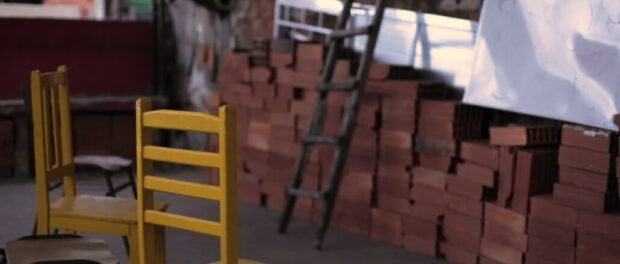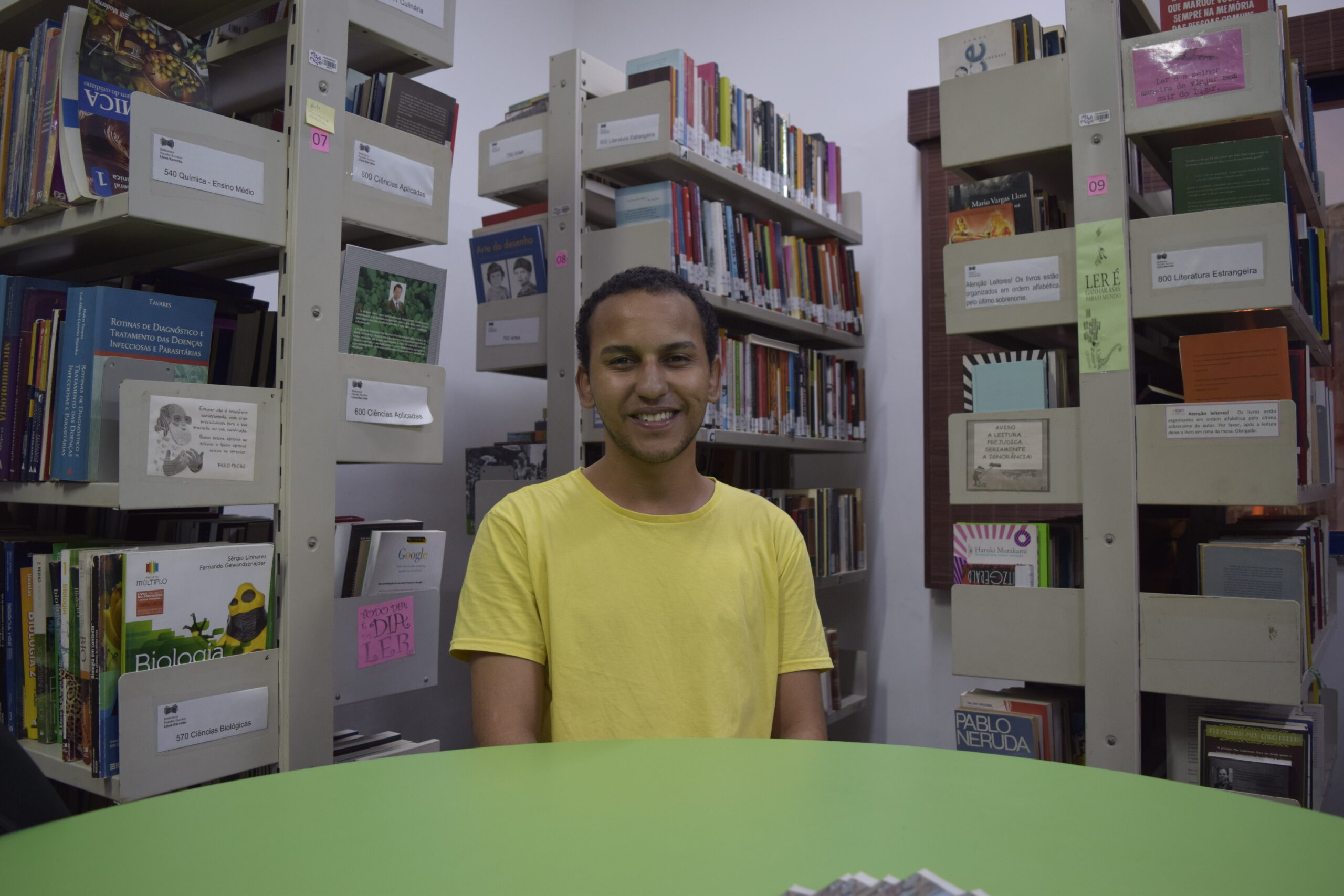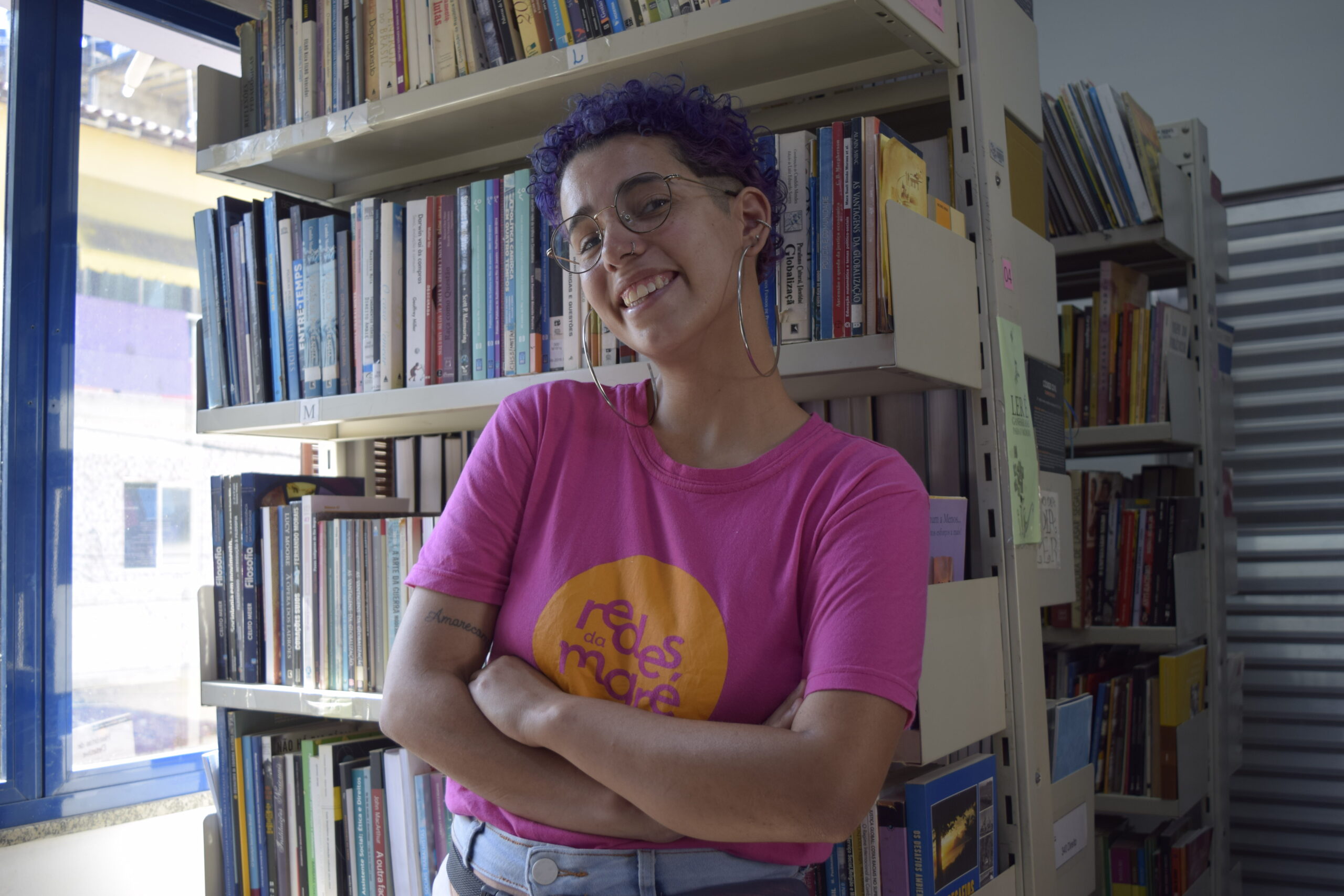
 This is our latest article in a series created in partnership with the Behner Stiefel Center for Brazilian Studies at San Diego State University, to produce articles for the Digital Brazil Project on climate impacts and affirmative action in the favelas for RioOnWatch.
This is our latest article in a series created in partnership with the Behner Stiefel Center for Brazilian Studies at San Diego State University, to produce articles for the Digital Brazil Project on climate impacts and affirmative action in the favelas for RioOnWatch.
August 11 is Student’s Day in Brazil. However, while the enrollment of young favela residents in university breaks through a significant barrier to social equality, it also exposes numerous other difficulties. These include a lack of study time, the complexity of course content, their own expectations for themselves and their future, and even their own self-esteem.
Lucas Feitoza, a resident of Vila do Pinheiro, one of the favelas that make up Complexo da Maré, admits he’s had a hard time staying in college. He has felt the effects of these difficulties on his self-esteem: at 23 years old, the journalism student at Unigranrio says that “staying in school is just as difficult as getting in.” He also thinks universities should address this issue and concern themselves with how to keep students from marginalized areas in college up to graduation. “How can we make this space more welcoming and not just scientific?” questions Feitoza.

Maré has 140,000 residents but only 1%, 1400 people, have graduated from university, according to the Maré Population Census organized by the local organizations Redes da Maré and Observatório de Favelas. And only 0.032% of Maré residents have some form of graduate degree. The study Academic Satisfaction in Brazilian Higher Education points out that, “despite the increase in university spaces in Brazil during the 2000s, this expansion was not accompanied by an integrated project, with policies that took into account the complexities that higher education demands from young students. Not to mention that it failed to consult their point of view on the subject.”
The article The Difficulties of Teaching and Learning in Elementary School points out that academic failure may be influenced by several factors, including social inequality, the cultural distance between the school and its surroundings, teachers who are not always well-prepared for the classroom, and inefficient methodologies. “Difficulties in learning may result from problems such as domestic violence, emotional factors, overcrowded or poorly structured schools, multigrade classes, a lack of educational material, and poorly prepared, demotivated teachers,” said Flavimilton dos Santos Leal in the article.
Barriers to learning arise in this context, resulting in difficulties in basic academic activities such as writing, reading, expressing oneself, interpreting texts, and solving mathematical problems, among others. These situations may be related to the student’s self-perception, as well as the approach of the school, the teachers, or the student’s wider external context (social, familial, or cultural). When left unaddressed, these difficulties can lead to students doubting themselves, bringing about disinterest and distancing them from school and university.
“Academic failure affects a student’s learning and self-expression, not to mention the limiting effect on their intellectual development. It often stems from a clash between the learner and the educational institution, which works to segregate them. To understand and address barriers to learning, we must examine the situation that promotes them,” Santos Leal adds.
Tiago Cícero, 29, was raised in Vila do Pinheiro, in Maré. He is a graffiti artist and graphic design instructor and wants to pursue a degree in Fine Arts but describes developing an emotional block towards writing in the fifth grade. “I wrote an essay that the whole class liked and it made them laugh. But when the teacher gave her feedback, she was extremely critical of my irreverence and spelling. I felt awful and didn’t want to write again after that.” Students don’t become unprepared because they are incapable of learning but rather when they are discouraged to learn: this has effects throughout their academic lives.
A teacher at the public secondary school CIEP César Pernetta in Maré, 62-year-old Maria do Socorro studied math and physics and has a graduate degree in Math Education. Socorro describes how she “always tells [students] about the importance of studying in our lives. Disinterest in school also reduces the range of their professional opportunities. Investment in technical schools and full-time study could be one way to address things, as well as improvements in teachers’ wages.”
In addition to these issues, students have to face the Enem, the admission exam for enrollment in many Brazilian universities and where students’ endurance for university study begins to be tested. The exam, which is also used to evaluate high schools throughout the country, covers content that is not usually taught in the public school curriculum given its numerous limitations. It imposes a mental marathon on students from the favelas: coming from a demotivating educational background, they are forced to study hard while dealing with a deadline fit for Olympic athletes.
For students from the peripheries, one way to prepare for the Enem is through community college preparatory exam courses (CPV in Portuguese), such as the UniFavela prep course, the Redes da Maré CPV, and the Ceasm CPV, all of which are in Maré, and the Marielle Franco CPV, in Morro da Providência, among many other programs. Feitoza says that he took the Enem four times. “By my fourth attempt, I felt more prepared.”
Gisele Reinaldo is a 35-year-old psychoanalyst-in-training through the Brazilian Institute of Psychoanalysis, as well as the Universidad Nacional del Saber in Spain. Reinaldo says emotional support in the academic environment is fundamental to deconstructing preconceptions surrounding emotions, since the various types of intelligence are connected to them: “Learning happens in the emotional part of the brain. Neglecting this reflects in our performance and the people we become.”
This disparity exposes a dramatic but decisive barrier to addressing the low rate of favela residents attending university: low academic self-esteem generated by the elementary school system.
We can’t talk about good academic performance without building a system that encourages academic self-esteem, in both elementary and higher education. Feitoza says that he compared himself to other students and noticed that each one had a rhythm. “I’m not behind. I’m working at my own pace. This helped me stop comparing myself to others and feeling guilty. It improved my self-esteem. Everyone has their own path. If I can respect other people’s paths, why can’t I respect my own?”
Reinaldo, in turn, says that in order to build an environment of esteem, we must start by encouraging students through dialogue. “We need to unlearn the old way of thinking to learn how to learn. We must apply self-esteem at all levels, respect the students’ worldview and their prior knowledge, and listen to them, starting with new stimuli.”
According to Reinaldo, academia remains distant from students because professors aren’t likely to have received socio-emotional education during their training. “It’s a very recent awareness. In universities, the reasoning is still very hierarchical, with very little communication between students and professors.”
The enrollment of students from marginalized areas, in relation to the demanding pace of university education, can be made less traumatic. It requires motivated teachers, a system that stimulates the self-determination and intellectual growth of students, a horizontal approach to education between the school and the student, and close monitoring of the most challenging cases.
Feitoza proposes that, in order for universities to become more inclusive, there should be support groups and exchanges with students who share a similar reality. “This might be a way to help favela residents adapt to the frenzied pace of academic life.”
Danielle Figueiredo, 27, from the Rubens Vaz favela in Maré, studies History at the State University of Rio de Janeiro (UERJ). Figueiredo says people who want to attend university shouldn’t put too much pressure on themselves. “There’s a lot of pressure to follow a socially-imposed timeline, and sometimes people keep changing their major because they got into university too early. It’s important to be there to get some kind of professional training, to reduce inequality, because it’s a public space and because it’s beneficial for our personal evolution.”

Despite so many challenges, the students shared some of the positive aspects of this process. University helped Figueiredo realize she wanted to become a teacher and led her to found the UniFavela University Prep Course. “It’s my passion project,” as she excitedly describes it.
Feitoza has already become more aware of his leadership and communication skills: “It’s improved my performance in the work environment, as well as my relationship with my colleagues and performance in my job.”
Unlike a marathon, where there’s only one winner, improving self-esteem is a collective victory: society wins as a whole. Both Feitoza and Figueirido are close to the finish line of this race and encourage those who intend to follow the same path. “You’ve got to make an effort every day, even in the face of tiredness and adversity… Getting in is already a huge victory. Staying there, even with this daily effort, is even better,” says Feitoza.
To Figueiredo, students who live in the favela should not give up. “Stick to your goal. You will face adversity but keep going. There will be bad people and bad circumstances, but also very good ones that you can take with you for the rest of your life. The classroom is where ideas are born,” the future historian advised.
About the author: Amanda Baroni Lopes is a journalism student at Unicarioca and part of the 1st Journalism Laboratory of Maré community newspaper Maré de Notícias. She has two blogs: AhManda Notícias, where she covers all kinds of content, and Hip Hop Docs about breakdancing in Brazil. She is the author of the Anti-Harassment Guide on Breaking, a handbook that explains what is and isn’t harassment to the Hip Hop audience and provides guidance on what to do in these situations. Lopes is from Morro do Timbau and currently lives in Nova Holanda, both favelas within the larger Maré favela complex.
